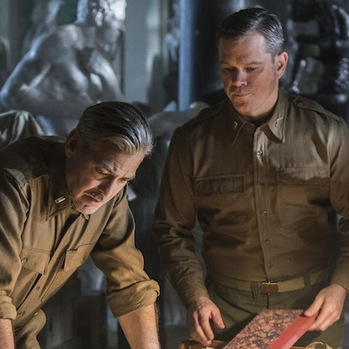Review:
"The Monuments Men"

Release Date: Feb. 7, 2014
Rating: PG-13 Running Time: 118 minutes If indeed “what a society deems important is enshrined in its art,” as the late educator Harry Broudy declared, what happens when the art that defines a people’s cultural identity and serves as its historical record comes under the threat of destruction? With his World War II fact-drama drama The Monuments Men, actor/director George Clooney argues that protecting a thousand works of art is worth the cost of a single life. In 1943, President Franklin D. Roosevelt established the Monuments, Fine Arts, and Archive program as a means to prevent one nation’s cultural heritage being meaningfully harms or completely eradicated by Adolf Hitler. That failed artist plundered private collections with the intent of housing the art in a museum in the Austrian city of Linz. While many works of art were recovered by the Allies and returned to their rightful owners or their heirs after World War II, many remain missing—presumed destroyed or are being fought over in court. See, for example, the excellent documentary Portrait of Wally by Austin filmmaker Andrew Shea. In The Monuments Men, Clooney is tasked with leading a ragtag Allied group of art historians and architects on a mission to locate and recover Nazi-looted works of art. Under Clooney’s command: Matt Damon, Bill Murray, John Goodman, The Artist Oscar winner Jean Dujardin, Close Encounters of the Third Kind’s Bob Balaban, and Downton Abbey’s Hugh Bonneville. There’s no denying the dedication to their cause. Unlike many others who understandably value human life above all else during the heat of battle, the Monuments Men are willing to make the ultimate sacrifice to protect and preserve a work of art of significant cultural and historical importance. Indeed, one life is lost protecting the Ghent Altarpiece when Nazis come for the 15-century relief from the Saint Bavo Cathedral in Belgium. These men’s actions speak louder than bombs in The Monuments Men, and the knowledge, wisdom, and perseverance of the real-life members of the program remain a shining example of the need to safeguard the works of art that tell a society’s story and reveal its character and contributions to the world. Clooney’s passion and understanding of art drives The Monuments Men. Unfortunately, Clooney lacks confidence in putting forth his position. In his dual roles as the film’s main character and its director, Clooney constantly feels the need to justify the Monuments Men’s commitment to their mission and their decision to put their lives on the line for a painting or a sculpture. He knows he’s not preaching to the choir, but his continued efforts to sway the unconvinced prove repetitious, and his argument quickly fall on deaf ears. This is never more evident in the film’s final scenes, which involves Clooney’s character first addressing Roosevelt and then looking back on his achievement in a coda that’s stolen from Saving Private Ryan. Which is unfortunate because The Monument Men has an important story to tell. Not that Clooney and his co-screenwriter Grant Heslov tell The Monument Men well. This is the first film from Clooney that lacks a true identity. The same can’t even be said about Clooney’s weakest film, the hit-and-miss screwball comedy Leatherheads. The Monuments Men just lingers, unsure of what it wants to be. There’s not enough humor for it to be a comic caper in the vein of Ocean’s Eleven and its sequels. There’s not enough drama or action for it to be considered a soul-stirring World War II drama on the scale of Saving Private Ryan. There also isn’t much tension to be found in The Monument Men, not even when lives are threatened or our heroes race to recover artwork before the Nazis can destroy it or the Russians make off with it. With Clooney dispersing his cast all over German-occupied Europe to seek out stolen artwork, The Monument Men feels episodic in nature, which only compounds the film’s inability to engage and involve. The cast seems too relaxed given the circumstances. Actually, Murray is downright sedate. Instead of possessing concern and urgency, they all seem about as comfortable as a group of tourists taking a summer trip to the great galleries and museums of Europe. Only Cate Blanchett, as a French museum clerk with inside knowledge of the Nazis’ activity, bursts with anger and communicates genuine fear of what the Nazis will do with the looted artwork. It’s a shame that The Monument Men relies solely on Blanchett to draw us into this seldom-told side story of World War II. Clooney’s a confrontational director who never backed down when it came to the political agendas of Good Night, and Good Luck andThe Idles of March. You might not agree with his politics, but you have to respect his commitment to his beliefs. With The Monuments Men, Clooney’s begs too much for our attention. He makes the fatal mistake of overselling the message ofThe Monuments Men. It is a profound one. Imagine a world without art. It would be soulless. Clooney knows it. He just doesn’t know how best to articulate this in The Monuments Men. Robert Sims Aired: Feb. 6, 2014 Web site: http://www.sonypictures.com/movies/themonumentsmen/discanddigital/ |
|
